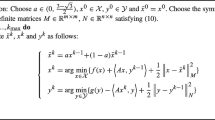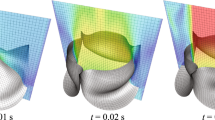Abstract
A meshfree method based on the first-order least-squares formulation for linear elasticity is presented. In the authors' previous work, the least-squares meshfree method has been shown to be highly robust to integration errors with the numerical examples of Poisson equation. In the present work, conventional formulation and compatibility-imposed formulation for linear elastic problems are studied on the convergence behavior of the solution and the robustness to the inaccurate integration using simply constructed background cells. In the least-squares formulation, both primal and dual variables can be approximated by the same function space. This can lead to higher rate of convergence for dual variables than Galerkin formulation. In general, the incompressible locking can be alleviated using mixed formulations. However, in meshfree framework these approaches involve an additional use of background grids to implement lower approximation space for dual variables. This difficulty is avoided in the present method and numerical examples show the uniform convergence performance in the incompressible limit. Therefore the present method has little burden of the requirement of background cells for the purposes of integration and alleviating the incompressible locking.
Similar content being viewed by others
Author information
Authors and Affiliations
Additional information
Received: 16 December 2001 / Accepted: 4 November 2002
Rights and permissions
About this article
Cite this article
Kwon, KC., Park, SH., Jiang, BN. et al. The least-squares meshfree method for solving linear elastic problems. Computational Mechanics 30, 196–211 (2003). https://doi.org/10.1007/s00466-002-0379-y
Issue Date:
DOI: https://doi.org/10.1007/s00466-002-0379-y




